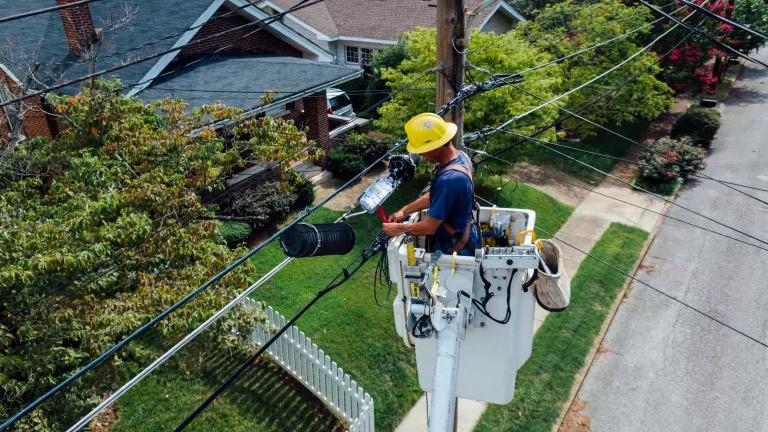Climate Challenge Cities Lead Clean Energy Scorecard

This blog was co-authored with Molly Bertolacini and Amanda Ullman.
Cities are on the front lines of climate action in the United States since the formal withdrawal of the United States from the Paris Agreement. Taking up the mantle of climate leadership, major metropolises across the country are leading by example to reduce energy use through energy efficiency— which is the cleanest, quickest, and cheapest way to cut pollution and a crucial strategy to solve our climate and affordability crisis. The American Council for an Energy-Efficient Economy (ACEEE) released its City Clean Energy Scorecard to recognize the most energy-efficient actions underway in cities across the United States. All 25 cities participating in Bloomberg Philanthropies-funded American Cities Climate Challenge were included in this analysis, with eight Climate Challenge cities (Boston, Seattle, Minneapolis, Washington DC, Los Angeles, Denver, Austin, and Portland) ranked amongst the top-10 scorers. Seventy-five cities were assessed in the scorecard, primarily selected for their role as the central cities in America’s largest metropolitan areas.
Cities were scored based on their performance crafting legislation and prioritizing energy efficiency in five categories: local government operations, community-wide initiatives, building energy efficiency, energy and water utility coordination, and transportation-focused strategies. Actions by others, like utilities, transportation authorities, and state government officials also contribute to the city’s scores, highlighting the importance of community-wide action in successfully reaching emissions reductions goals.
ACEEE made specific changes to this year’s scorecard that were designed to highlight the importance of renewable energy integration and emphasize the benefits that energy-efficiency provides in promoting equity in communities. Equity scores specifically take into account city-wide efforts for inclusivity in workforce development programs, renewable energy incentives for low-income households, and equity-driven climate and energy planning that amplifies of voices of people of color, low-income communities, immigrants, refugees, and other historically underrepresented groups during policy and program development. These efforts might include enhanced public engagement strategies and feedback platforms, such as non-English community forums, for marginalized community members to actively participate in program development. Cities are also creating formal roles for community residents to fill, such as positions on the city board or various committees. Other exemplary equity-based efforts often include an investment in community solar projects and commitments from city utilities to offer programs for low-income and multi-family households. As a whole, the scorecard serves to recognize areas in which cities have already taken concrete action to improve their energy efficiency, as well as future interventions cities have identified to push further.
Climate Challenge Cities Leading the Way
Local Government Operations: Boston, Atlanta, Orlando, and Portland were all recognized for their efforts supporting energy-efficiency in local government operations. All four cities scored highly in their efforts to address sustainability within municipal procurement standards, identifying themselves as nationwide leaders through high-efficiency vehicle and green building requirements for municipal departments. These policies amplify city governments’ roles as community examples of sustainability, requiring municipal buildings to demonstrate efficiency through methods like exceeding city building energy codes or becoming LEED certified. ACEEE also highlighted the efforts of Portland in implementing a citywide Climate Action Plan to carbon emissions by 53 percent by 2030 and Orlando’s Municipal Operations Sustainability Plan’s goal of becoming greenhouse gases (GHG)--neutral by 2030.
Community-wide Initiatives: Washington, Seattle, Denver, Minneapolis, and Orlando were among the highest scorers for community-wide initiatives. All five cities have established stringent community-wide climate and GHG reduction goals, adopted local distributed energy systems policies to decentralize energy storage, and set forth plans to mitigate urban heat island. ACEEE specifically acknolwedged Washington’s goals to mollify the effects of urban heat island through an increase in tree canopy coverage to 40 percent by 2032, and an increase in wetland acreage to 50 percent by 2032. Several of the highest scoring cities were also recognized for their equity-driven approaches to their climate policies and clean energy initiatives.
Building Energy Efficiency: Building energy efficiency emerged as a strong point of leadership for many Climate Challenge cities. As the top scorer in this category, Boston has shown unique leadership in its maintenance of a stringent energy code and high prioritization of energy workforce development. ACEEE also recognized the strides made by San Jose in improving its building-energy focused landscape, jumping up to 5th place from 20th in this category after offering greater support to builders and contractors in energy code compliance and implementing a benchmarking and disclosure policy for multifamily and commercial buildings larger than 20,000 square feet. Seattle and Los Angeles, also Climate Challenge cities, were both among the highest scorers, showing superiority in their building policy incentives and financing offerings (Seattle, Los Angeles), as well as their stringent building energy codes (Seattle, Los Angeles.)
Energy and Water Utility Coordination: Los Angeles, Boston, and Minneapolis were recognized for the high level of savings their utilities programs provided. Together with cities, the utilities are taking action to increase their supply of renewable energy and increase programs for low-income and multifamily households. Cities are continuing to cultivate formal partnerships with their utilities. Minneapolis, for example, was highlighted by ACEEE for its Clean Energy Partnership, established between the city and its utilities in 2014. This partnership works to move the city to 100 percent renewable energy and fulfill the goals of the Climate Action Plan and Energy Vision of Minneapolis.
Transportation-focused Strategies: As the Environmental Protection Agency-named highest emitting sector of GHGs in the United States, transportation offers high-potential for improvements in citywide energy efficiency. ACEEE scored cities on their implementation of policies that encouraged alternative forms of transportation, as well as policies that make streets safer for drivers, bicyclers, and pedestrians and encourage bike and car share programs. Climate Challenge cities Washington, Boston, Portland, and Seattle were all recognized as leaders in the transportation category. Washington DC, Boston, and Seattle were specifically lauded for their efforts in transportation GHG reduction goals while Portland demonstrated superiority in land use and transportation integration with its sustainability requirements for new construction.
Next Steps
The actions measured by ACEEE’s City Clean Energy Scorecard are demonstrative of the commitments that local leaders are making to reduce greenhouse gas emissions and address climate change throughout the United States. Each of the 25 cities participating in the American Cities Climate Challenge have well-designed plans that allow them to achieve ambitious climate goals in their cities, while also putting the health and economic well being of their residents front and center. But the work can’t stop with these 25 cities, and the scorecard provides a roadmap for all cities to improve their own policy design processes and implementation, based on their current level of energy efficient policy proliferation. Lower scoring cities are encouraged to adopt greenhouse gas reduction targets and partner with utilities to promote renewable energy adoption, while cities in the top scoring tier are encouraged to push further and implement more advanced policies. Cities are leading the fight against climate change, and their residents are benefiting from the diverse array of energy-efficient programs and legislation.



